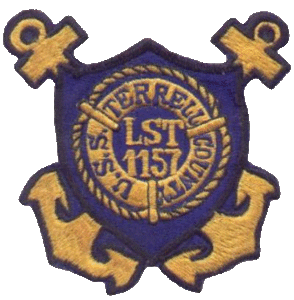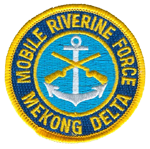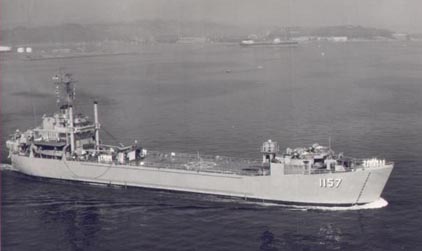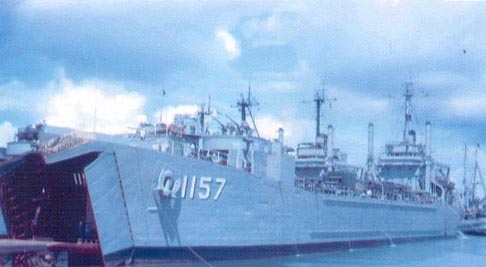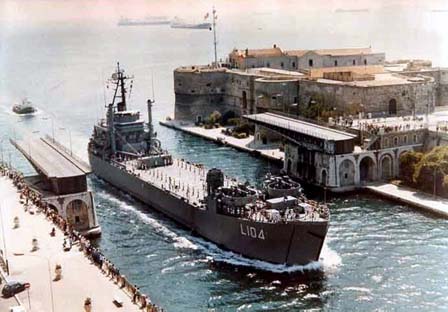LST-1157 was laid down on 3 March 1952 at Bath, Maine, by the Bath Iron Works, launched on 6 December 1952, sponsored by Mrs. John H Spiller, and commissioned on 14 March 1953, Lt. Comdr. L. I. Reynolds in command.
Following shakedown training and operations out of Little Creek, Va., LST-1157 departed Morehead City, N.C., on 25 September 1953 with a full load of troops and amphibious vehicles for transfer to the Pacific Fleet and arrived in San Diego on 25 October. Assigned to Amphibious Forces, Pacific Fleet, LST-1157 operated out of San Diego into February 1954 before getting underway for the Central Pacific. She soon took part in moving natives from northern islands in the Marshalls to new homes in southern islands in May and June 1954. This lift involved the shipment of lumber for new homes, schools, and churches, as well as of the personal belongings and livestock of the natives.
Returning to a routine of local operations upon arrival at Port Chicago on 2 July, LST-1157 was named USS Terrell County (LST-1151) on 1 July 1955. She departed the west coast on 9 September 1955 for her first Western Pacific (WestPac) deployment, and she operated out of ports in Okinawa and Japan before returning to the west coast and resuming local operations.
Her second WestPac deployment commenced on 13 August 1957 In the succeeding months, Terrell County steamed a total of 25,600 miles, conducted three landing exercises and four troop lifts; and transported 500 vehicles and 1,500 men in five beachings and nine “marriages” to landing causeway sections. During this period, she also served as flagship for Landing Ship Squadron ONE. The sudden flare-up of tension halfway around the world in Lebanon temporarily interrupted the LST’s routine. The ship sailed for Pearl Harbor and conducted emergency exercises in the Hawaiian area before the Middle Eastern crisis abated.
Departing the west coast on 15 April 1959, the ship headed across the Pacific for her third WestPac deployment. She subsequently returned to San Diego in November and began an extensive overhaul. On 16 June 1960, the ship set sail for her fourth WestPac cruise.
In July 1960, her permanent home port was changed from San Diego to Yokosuka, Japan. In the Far East, Terrell County participated in a wide variety of operations with beachings and landings of embarked marines and their equipment. Occasionally, maneuvers with warships of other SEATO powers took place in locales ranging from Thailand to Korea and from Borneo to the Philippine Islands. Liberties at Hong Kong and Tokyo brightened a sometimes uneventful deployment while typhoon evasions, too, were common occurrences.
On 4 August 1964, North Vietnamese torpedo boats reportedly attacked destroyers Maddox (DD-641) and Turner Joy (DD-951) in the Gulf of Tonkin, off Vietnam. Terrell County proceeded to Iwakuni, Japan, where she remained on alert until 20 August, when she headed for Yokosuka and extended upkeep.
Next, local operations in Japanese and Korean waters occupied the ship through the end of 1964. Underway training began the ship’s new year and lasted through February and into March 1965. On 12 March, the ship departed the Ryukyus, bound for South Vietnam. She arrived at Danang four days later, unloaded embarked men and cargo, and then returned to Yokosuka for major overhaul.
The ship returned to Vietnamese waters following the refit and transported Marine Air Control Squadron 9 to Chu Lai before returning to Japanese waters. Operational commitments subsequently overrode refresher training out of Yokosuka in July, forcing the ship to embark Naval Beach Group 1. Dispatched to Okinawa on 1 August, Terrell County evaded a typhoon en route and made port to load Regimental Landing Team 7 before sailing on the 9th for Chu Lai. Remaining at that American base from 15 to 17 August, the ship evaded two typhoons en route back to Japanese waters before she reached Yokosuka on 25 August.
Following further refresher training and an upkeep period, the LST got underway for South Korea on 21 October and arrived at Pusan two days later. She embarked elements of the Republic of Korea’s “Tiger” Division — marking the first time that a Korean expeditionary force had been sent abroad in nearly 1,000 years. Sailing on 25 October, Terrell County arrived at Qi Nhon, South Vietnam, on 2 November and debarked her troops.
The ship operated in support of Operation “Blue Marlin” from 4 to 17 November — included in this deployment was a landing near Chu Lai and a trip to Danang with support equipment on board. Once she completed this assignment, the LST received orders to proceed to Nha Trang and thence to Cam Ranh Bay for further operations. On 21 November, the ship embarked ROK marines and U.S. Army support units for transport to Tuy Hoa.
Soon after reaching Tuy Hoa, the ship, with her troops still embarked broached in the heavy surf and went aground. On 24 November, Molala (ATF-106) and Mahopac (ATA-196) succeeded in pulling Terrell County “off the beach.” Subsequently patched and pumped dry, the LST got underway on 2 December, under tow for Yokosuka, where permanent repairs could be made to her damaged hull.
The restoration work was complete on 22 February 1966, and the ship got underway for Naha, Okinawa. She embarked men and equipment of the Army’s 1st Engineering Battalion and transported them to Vietnam. She completed the task on 7 March and then made another transport run from 14 to 26 March, carrying American cavalrymen from Naha to Saigon.
After coastal operations off Vietnam from 27 March to 5 May, Terrell County retired to Japan on one shaft, since her starboard shaft had ceased functioning. On 13 May, as the landing ship crept along toward Yokosuka, lookouts sighted the Soviet merchantman Makhachala two points abaft the starboard beam and closing. Both ships continued steady on their courses, as Terrell County assumed that the heavily-laden Russian would stay clear. Finally, both ships were forced to maneuver radically to avert a collision.
Shaft troubles continued to plague the landing ship but did not interfere with the completion of her transport and cargo missions. She continued these duties into the fall of 1966. In October, Terrell County sailed to Subic Bay to serve as the United States’ representative at the 22d annual Leyte Gulf celebration which commemorated the American landings of 1944 supported by an earlier breed of LST’s.
Subsequently completing a Nuclear Weapons Acceptance Inspection — the first ship in her squadron to do so, Terrell County conducted two more transport lifts — both to Chu Lai, Vietnam before rounding out the year 1966 by joining Task Unit (TU) 76.0.7 as part of the Danang-Chu Lai shuttle. The ship remained with TU 76.0.7 until 18 January 1977, when she sailed for Okinawa. She proceeded thence to her permanent WestPac home port, Yokosuka.
Transport operations to Okinawa, intermingled with type and refresher training exercises, continued through the spring. On 9 July, Terrell County relieved Tom Green County (LST-1159) as part of Amphibious Ready Group Bravo, TG 76.6, then engaged in the midst of operations “Beaver Track” and “Buffalo”, Given the mission of “sea-trailer” or contingency logistics, she carried ammunition, medical supplies and vehicles assigned to the 2d Battalion, 3d Marine Division, the Marine units bearing the brunt of the fighting ashore. For two months, Terrell County supported operations in Quang Tri province, just south of the demilitarized zone (DMZ), and conducted a series of landings in rapid succession: Operations “Bear Chain”, “Kangaroo Kick” and “Belt Drive” before heading for Hong Kong on 19 September.
Following visits to Okinawa and Subic Bay, Terrell County loaded ammunition and causeway sections and departed Yokosuka on 1 March 1968, bound for Vietnam. However, while steaming in company with Washoe County (LST-1165) and Westchester County (LST-1167), Terrell County lost two causeways which were torn loose by heavy seas. Returning to Yokosuka, the LST obtained replacement sections and embarked Amphibious Construction Battalion (ACB) 1 before getting underway again and rejoining her two sister ships en route to Vietnam. Arriving at Danang on 13 March, the ship delivered her causeways and proceeded to Tien Sha to unload her ammunition and to take on the gear necessary for the ship’s forthcoming operations.
Joining the Amphibious Ready Group once again Terrell County operated off My Thuy, Vietnam, from 15 March to 12 April before retiring to Subic Bay. She rendezvoused with Valley Forge (LPH-8) off Vietnam on 29 April for operations on station in area “Alice.” Subsequently sailing for Hong Kong on 12 May for a five-day visit, Terrell County headed for Buckner Bay, Okinawa, to deliver cargo from Danang before moving to Yokosuka for an overhaul which lasted through the summer of 1968. Training and drills occupied the ship well into the fall of that year, before she proceeded back to Vietnam.
From 1 to 7 December, Terrell County conducted general drills and gunnery exercises before beaching at Vung Tau to load ammunition. On 10 December the LST relieved Washoe County as support LST for Task Force 115 on Operation “Market Time”, the interdiction operation attempting to interrupt North Vietnamese logistics operations in South Vietnamese coastal waters.
On 1 January 1969, Terrell County was assigned additional duty as support ship for the fast PCF boats which were aptly nicknamed Swift Boats engaged in riverine operations off the lower Ca Mau peninsula.
Three days after undertaking this duty, the LST launched her LCVP’s to participate in an assault north of Song Ong Doc, in conjunction with PCF’s and Song Ong Duc regional forces. When Viet Cong gunners opened up on the Allied force, Terrell County returned the fire, killing five Viet Cong soldiers and assisting in the successful withdrawal of the assault forces.
Terrell County then participated in other operations against the Viet Cong, firing on positions along the banks of the Song Bo De and Duong Keo rivers, coordinating PCF’s, aircraft, and ships’ batteries in firing on Viet Cong concentrations and staging areas. As a result of these operations, Viet Cong extortion from local Vietnamese foresters and fishermen in the lower Ca Mau peninsula was substantially, albeit temporarily, curtailed. Relieved as “Market Time” support LST, Terrell County got underway on 5 February 1969 for the Philippines and arrived at Subic Bay six days later.
Training and local operations in Japanese, Okinawan and Philippine waters preceded yet another Vietnam deployment which commenced upon arrival at Vung Tau on 8 May. The next day, the ship relieved Westchester County and found that the tempo of operations in the lower Ca Mau peninsula had increased. With 50 men of the Mobile Strike Force embarked, as well as an Army scout helicopter and an Underwater Demolition Team (UDT) detachment, Terrell County provided support for multifaceted operations designed to destroy Viet Cong factories, training and supply camps, and extortion stations. She remained on station in the Ca Mau region until 25 June. A visit to Hong Kong from 8 to 24 July preceded the ship’s sailing for Yokosuka and upkeep.
The ship subsequently carried causeways to Danang, Vietnam, before resuming duties as support LST for continued interdiction and Pacification operations at her old haunt, Ca Mau. From 10 October to 25 November, Terrell County supported Operation “SEAFLOAT ” With an embarked helicopter detachment, the ship undertook refueling and rearming of helicopters, and provided ammunition and services for PCF’s, SEAL teams, and troops.
The ship also undertook small boat and PCF maintenance, as well as providing numerous personal services — laundry and small stores, to name but two. During this period, Terrell County established regular mail deliveries to off-shore units by helicopter — the first such services provided in the Ca Mau vicinity. On 15 October, the LST fired a gunfire-support mission against Viet Cong vessels.
On 25 November, Vernon County (LST-1161) came alongside; and Terrell County entrusted her “SEAFLOAT” support duties to the newcomer before sailing for Danang. Loading troops and equipment on 30 November, she got underway on 1 December to neutralize a threatened mortar attack before returning and refueling from SS Hampton Roads.
Terrell County then returned again to Vung Tau, relieving Washoe County as “Seafloat” support vessel, providing fuel, ammunition, and communications support for a brood of smaller craft. She also assisted Krishna (APL-38) by receiving that ship’s stores from provision ships and delivering them, and by also serving as a platform upon which Krishna’s mail and spare parts could be helicoptered in. Terrell County also provided repair and maintenance services for PCF’s and smaller craft, such as PCR’s. She remained at this duty through the spring of 1970.
When American forces invaded Cambodia in the spring of 1970, to deal with troublesome communist “sanctuaries” in the “parrot’s beak” area, Terrell County operated as “contingency LST” from 17 to 19 May 1970. She then proceeded to Danang to pick up equipment and a “Seabee” causeway section for transport to Yokosuka. Soon after reaching her home port, she commenced an upkeep period which lasted until 1 August.
A trip to Hong Kong and a final deployment to Vietnam rounded out the ship’s stay in the Far East On 1 October, the Panama-registered freighter SS Tung Yang lost all power and wallowed in heavy seas. Terrell County and Washoe County went to the ship’s assistance, and Terrell County passed a towline to the vessel. By mid-afternoon on 2 October, Tung Yang rode at the end of the towline but, late the next day, the tow parted, and the freighter was once again adrift. Deliver (ARS-23), also in the area, soon retrieved the tow, and thus allowed Terrell County to proceed for Chu Lai.
After loading retrograde Marine and Navy vehicles, the ship sailed on 6 October for Subic Bay. Arriving on 8 October, the LST took on supplies and got underway on the 9th in company with sister ship Washoe County and three MSC’s. The two LST’s provided support services for these craft during the long voyage to the west coast.
The little convoy arrived at San Diego on Armistice Day, 11 November 1970. After offloading her cargo on the 13th, Terrell County proceeded to San Francisco for four days liberty before continuing northward. She reached Bremerton, Wash., on 24 November and was placed in “In Commission in Reserve” status. Her inactivation work lasted into the new year. On 25 March 1971, Terrell County was decommissioned at the Puget Sound Naval Shipyard, Bremerton, and placed in the Reserve Fleet there. She was berthed at Pier “D” — Inactive Ship Facility, Bremerton. The LST was sold to Greece in March 1977.
Awards earned during the Vietnam War: Presidential Unit Citation, Navy Unit Commendation, (3) Meritorious Unit Commendation, RVN Gallantry Cross with Palm, RVN Civil Action Medal, First Class, with Palm, RVN Campaign Medal with 60’s device and the Vietnam Service Medal with (10) Battle Stars.

